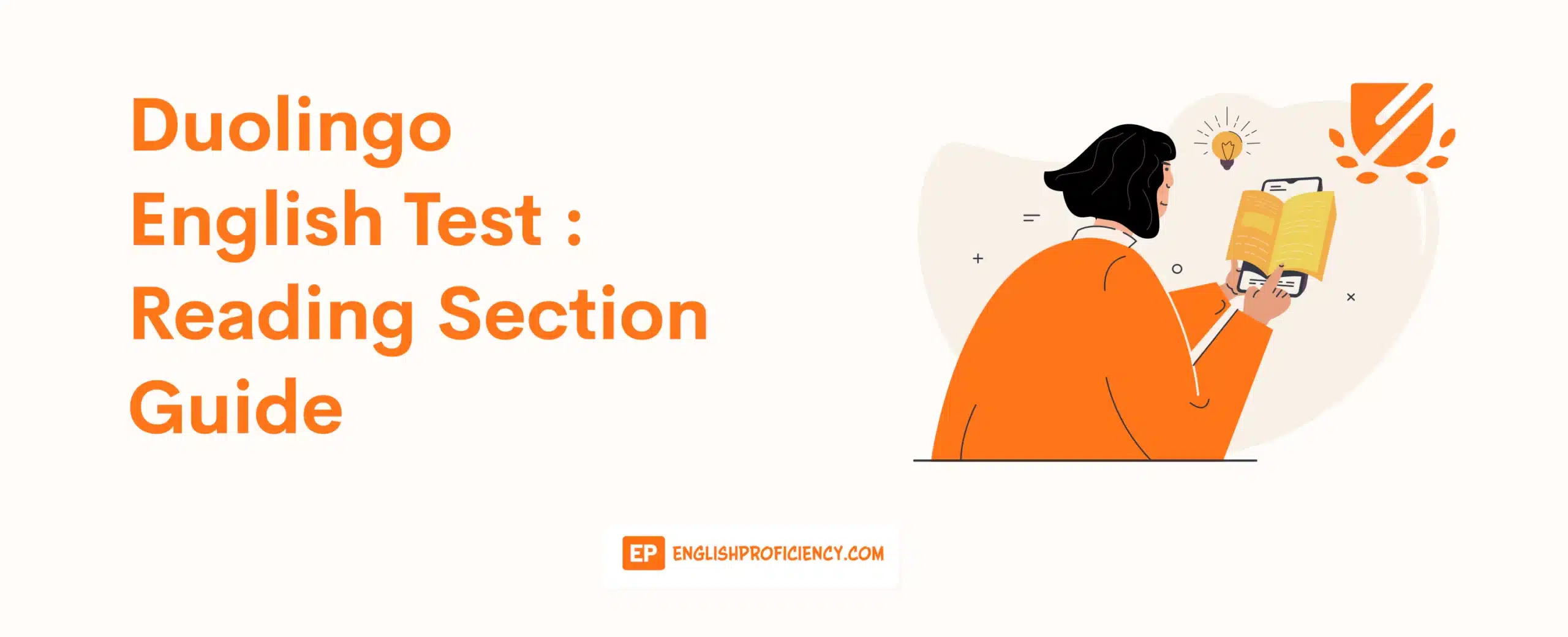This guide will provide you with all of the information you need to prepare for the Duolingo English Reading Test sections. Sample and practice questions are also included in this guide.
- What is the Duolingo English Test?
- What is the Production Scoring Criteria in the Duolingo English Test?
- General Tips for Taking Duolingo English Test
- What are the Different Reading Question Types on the Duolingo English Test?
- Useful Tips to Prepare for Reading Question Types on the Duolingo English Test
- How to Improve Your English Reading Skills?
- Sample Duolingo English Test Reading Questions with Model Answers
- Duolingo English Test Practice Reading Questions
- Additional FAQs about the Duolingo English Test Reading Questions
What is the Duolingo English Test?
The Duolingo English Exam is an English proficiency test that will measure your English language competence. This exam, which employs a highly adaptable methodology, is a unique approach to demonstrate your English proficiency.
In other words, if you’re responding correctly, the question will become tougher with time. However, if you choose the incorrect answers, the exam will give you easy questions. As a result, the system can accurately assess your level.
Many colleges throughout the globe accept the Duolingo English Test as part of their admissions criteria for overseas students. The Duolingo English Test, unlike the TOEFL and IELTS, is taken on-demand from your computer.
What is the Production Scoring Criteria in the Duolingo English Test?
The Adaptive Test is the sole graded component of the Duolingo English Test, where the applicant’s responses will be examined and scored. Different Question Types will assess you differently, and you will receive scores based on the responses provided. Read for more information about the adaptive system.
Questions in sections like Read and Complete, Read and Select, and Read Aloud will be graded automatically using systems and procedures created expressly for the question categories. Duolingo’s systems will compare your answers to the correct ones and assess the differences and similarities.
- Also, you will receive any penalty for giving incorrect or incomplete answers. Partially correct responses may receive half credit.
- If you miss a question, you may lose more points than respond incorrectly. As a consequence, you should answer all of the given questions.
Questions like Read and Write, and Read and Speak, will be scored using a grading system. Like expert human raters, the grading engine understands and assesses a candidate’s English Proficiency. The engine will evaluate the parameters: grammar correctness and complexity, lexical sophistication and diversity, your ability to answer questions thoroughly, and fluency for both oral and written tasks.
Please be aware that computer algorithms will analyze and score the questions, while human proctors will assess the video recordings they have provided.
General Tips for Taking Duolingo English Test
The Duolingo English Test examines reading, writing, speaking, and listening abilities. How you study and practice English helps you prepare for the DET exam. It might involve watching English movies, talking to friends, reading newspapers and publications, and writing. There are also many free internet resources.
- Start with the Practice Test: On the Duolingo English Test, you will be given a sample test. We suggest taking a practice test first to prepare for the actual exam. There is no charge for taking the sample test. It delivers an estimated score range after completion. Remember that the sample exam is shorter (8 minutes), and the score range is unofficial and unreliable.
- Prepare your Test Environment: Because you will be taking the Duolingo English Test online, you will want to ensure you have everything you need. You must:
- A government-issued picture identification card
- A room that is peaceful and well-lit
- Approximately one hour of unbroken time
- A computer with a built-in camera on the front.
- An internet connection and a browser that is compatible are required.
- Know the Rules and Regulations: A proctor will watch your exam video once you finish it to verify you followed the guidelines. The restrictions include not using earbuds, conversing with others, or glancing away from the screen. You must follow these guidelines throughout the exam, or you will have to retake it.
- Get Ready to Showcase Your Skills: You will be interviewed on camera and asked to write. Both are shared with a university. This is a terrific way for foreign admissions professionals to learn about you and your English language skills. Each video interview and written sample has two question subjects. Then you will talk for 1–3 minutes and write for 5–10 min.
- Not to worry, a timer will keep track of you. If you’re stuck, take a deep breath and answer each question. You may evaluate your replies before sending them to institutions. You may retake the exam if you don’t like your results.
You should work on all parts of their skills, from reading to listening. To do well on the Duolingo English Test, you must have a sound plan and preparation method. You should ensure that their preparation for the Duolingo English exam is on track.
The following are some preparatory ideas to assist applicants in increasing their productivity and efficiency.
- To answer a question, use all of the time you have available. You will not obtain a higher score if you answer questions more quickly.
- Give lengthier replies than are necessary if possible. For example, write more than 50 words or talk for more than 30 seconds. A more detailed response might help you obtain a higher score if you use English effectively and your response is pertinent to the inquiry.
- If you make a mistake, you will not be punished until you click NEXT to submit your answer and go on to the next question, so take the time to rectify it. Once you’ve hit NEXT, you can’t go back to the previous question.
- Try not to stare at the timer too often since it might lead you to lose focus on the task at hand.
- Allow enough time after each question to double-check your answers.
What are the Different Reading Question Types on the Duolingo English Test?
Unlike other English Language Proficiency tests where each skill has a section, the Duolingo English Test differs as it measures your proficiency holistically through subscores:
- Literacy: Your ability to read and write.
- Comprehension: Your ability to read and listen.
- Conversation: Your ability to listen and speak.
- Production: Your ability to write and speak.
While reading, writing, speaking, and listening are all crucial language abilities, research suggests that combining them might better reflect how language is utilized in everyday situations. People must engage numerous talents simultaneously to use language effectively and naturally, particularly in academic contexts.
In this case, the Duolingo English Test incorporates reading skills with the other abilities through various question types under the Literacy and Comprehension subscores.
The independent tasks will require you to complete paragraphs, read aloud sentences, or determine the correct English words, demonstrating more discursive writing knowledge and language skills.
Unlike the other tests in the DET, you will read a passage and then answer questions. Let’s look at the different question types that you will encounter in the DET.
1. Read and Complete
For this challenge, you must fill the missing letters in chosen words in a provided text. This language test will assess your vocabulary, sentence construction, and grammatical structures.
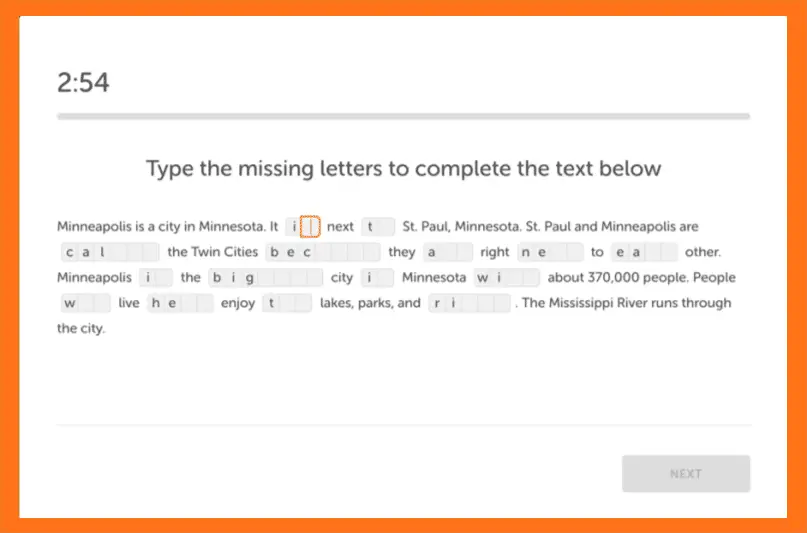
2. Read and Select
In this task, DET will give you a list of terms, some of which are genuine and other pseudowords, and you must choose just the proper ones.

3. Read Aloud
This challenge tests your ability to pronounce individual words and your understanding of sentence stress and intonation. Remember that English is a stress-timed language, which means certain syllables will be longer or shorter than in other languages like Spanish, French, or Cantonese.
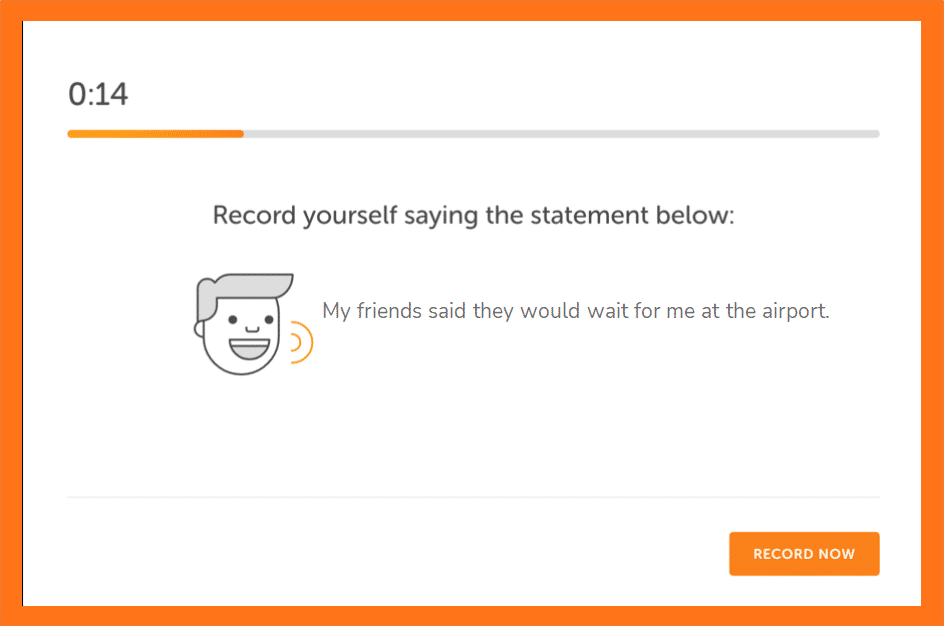
4. Read and Write
This test will give you a written prompt to respond in at least 50 words. However, you will not have a choice in terms of the prompt you will get.
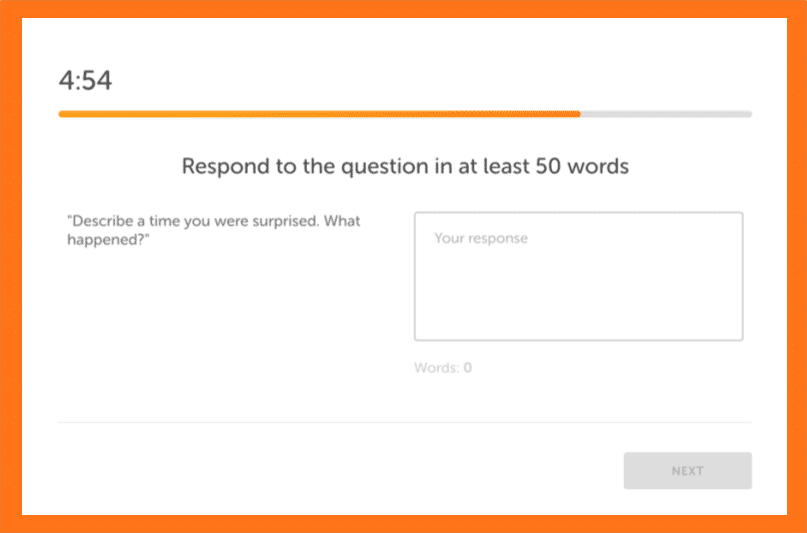
5. Read and Speak
This task provides you with some cues on the subject they want you to discuss. The system evaluates the video and marks you for your fluency, correctness, pronunciation, and how effectively you can get your idea across since the exam is filmed using your camera.
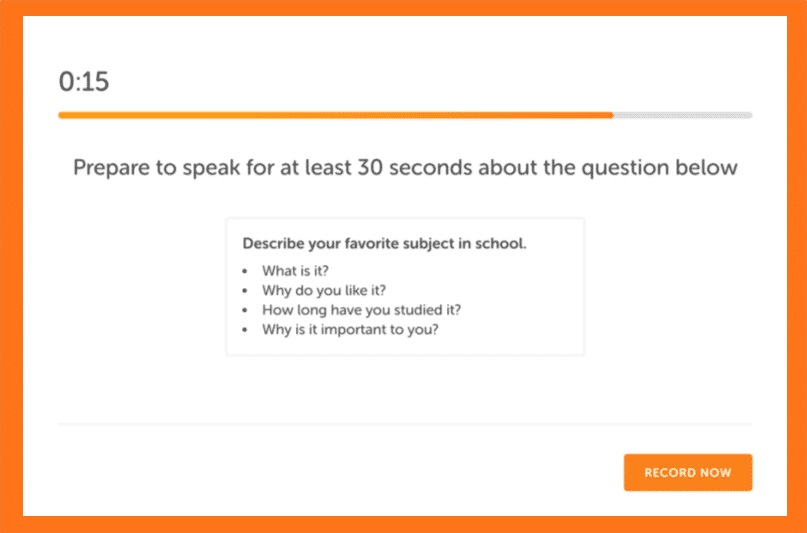
Useful Tips to Prepare for Reading Question Types on the Duolingo English Test
The Reading Section (or Question types) of DET will assess you on the following skills, and it expects you to engage in active reading. This involves reading for something or reading beyond meaning.
1. Cloze Test
In the Duolingo English Test, C-Test may seem an easy question but a tricky one.
A cloze test is a method of assessing comprehension in which words are removed from a passage or phrase (typically every 5th word or so), and the reader/learner is asked to fill in the blanks. As a result, it’s frequently referred to as a gap-filling activity.
Here are a few tips to improve your performance on the C-test (Cloze test):
- Find the Theme: The first step is to comprehend the passage’s concept, and here is where students often make mistakes, reading just the first line and then solving the cloze exam. To understand the text’s subject, read the whole paragraph attentively. Finding the topic can aid you in finding answers more quickly and using the replacement approach.
- Slowly and thoroughly read: To answer any cloze exam question, read it carefully and thoroughly to comprehend what it is about. It will assist you in forming an opinion on the subject. As a result, read the text at least twice slowly. It will help you in comprehending the passage’s concept. Everything goes wrong after the text’s topic is established. After that, you may select the best potential term from the available options.
- Identify the tone of the passage: After reading the text and identifying the topic, the next step is to determine the passage’s tone. It relates to the cognitive process used to write it, such as caustic, humorous, narrative, etc. The pattern is written in a chronological sequence, so spotting it in the phrase will help you figure out what word you need to fill it with.
- Make connections: Another thing to remember is that it is a passage with sentences related to each other, not a list of isolated claims. So approach the questions with this in mind; otherwise, there’s a good possibility you’ll make some dumb blunders. There will undoubtedly be some kind of logical link between the statements. Simply attempt to grasp that relationship, and your odds of picking the right choice will increase significantly.
- Make use of frequently used words: You may be perplexed and unable to pick from the possibilities presented. In this instance, re-visit the alternatives. If you observe a word/phrase used more often than others, choose that choice. It might be a verb, article, preposition, etc. Good grammar will benefit you a lot.
- Elimination process: The selections are often so close together that it is impossible to tell which one is correct making the test more difficult. The elimination technique may be used to eliminate incorrect replies and out of context.
2. Collocations
A collocation is a grouping of two or more words that often occur together. To native English speakers, who employ these combinations all the time, they simply seem “correct.”
Various distinct forms of collocations are formed by combining verbs, nouns, adjectives, and other words. These are some of the most common collocation types:
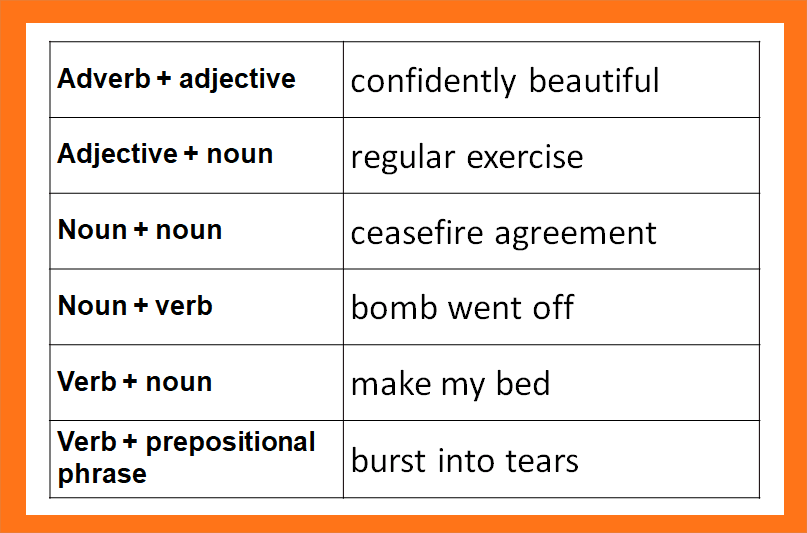
Do you need to learn collocations?
The answer is simply — YES, because of the following reasons:
- Your speech will sound more natural and will be easier to understand.
- You’ll be able to express yourself in new and more varied ways.
- Language in chunks or blocks is simpler for our brains to memorize and utilize than single words.
How to learn and practice collocations?
- Collocations are important to be aware of, and you should strive to identify them when you see or hear them.
- Treat collocations as though they were separate words. Consider them as separate blocks or chunks.
- When you learn a new term, make a list of other words that are similar to it (remember rightly, remember distinctly, remember vaguely, remember vividly).
- As much as possible, read. Reading is a fantastic approach to learning vocabulary and collocations spontaneously and in context.
- Regularly review what you’ve learned. After learning new collocations, practice utilizing them in context as soon as feasible.
- Collocations should be learned in groups that are convenient for you. You may study them by theme (time, number, weather, money, and family) or by a specific word (take action, take a chance, take an exam).
- Any decent learner’s dictionary will provide information on collocations. You may also discover specialist collocation dictionaries.
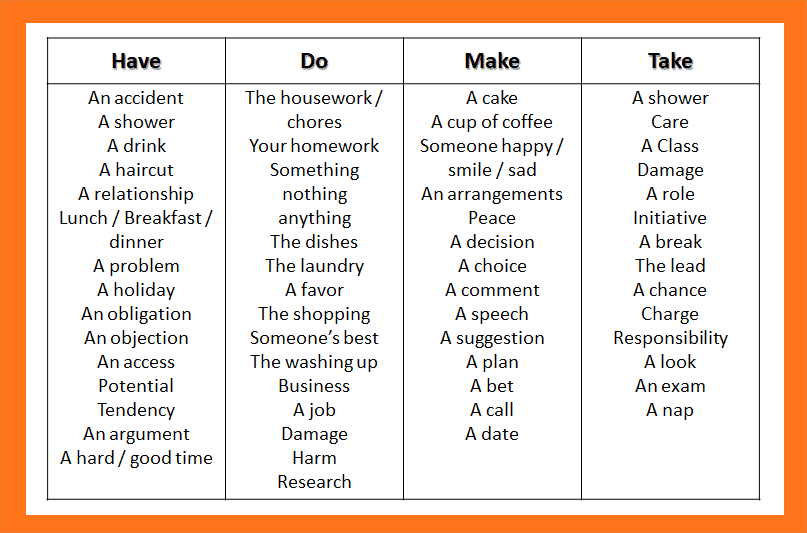
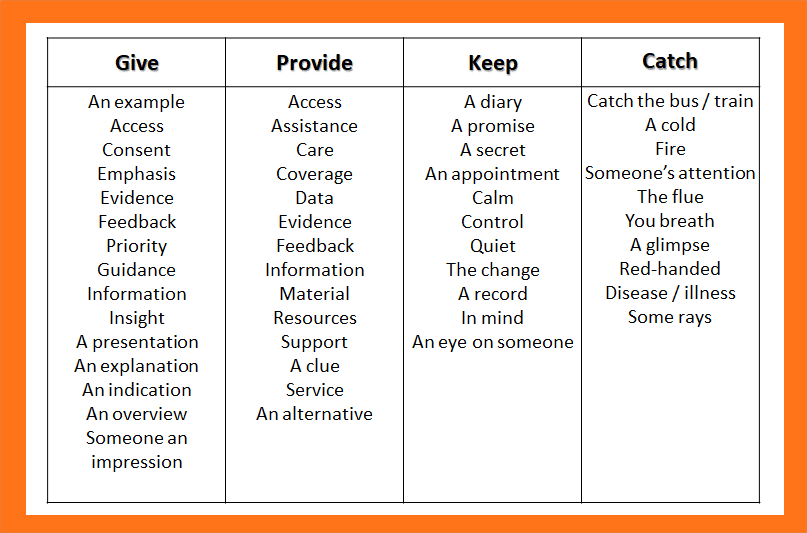
Sample Sentences Using Collocations
Collocations come in a variety of shapes and sizes. Adjective + adverb, noun + noun, verb + noun, and so on are examples of collocations.
In the samples below, you’ll find seven different forms of collocation.
-
Adverb + adjective
- “Were they fully aware that the entire thing is a setup?”
- “One of the Ms. Universe winners uttered this famous quote: ‘I am confidently beautiful with a heart.’”
-
Adjective + noun
- “Regular exercise is a must to keep our bodies fit and healthy.”
- “On its maiden voyage, the Titanic sank, drowning with its 1,500 passengers.”
-
Noun + noun
- “As we end the speech, let’s give Mr. Moises a round of applause.”
- “After long hours spent in the store, she came home with only a bar of soap.”
-
Noun + verb
- “Unfortunately, the bomb went off, killing hundreds of civilians.”
- “The plane took off on schedule.”
-
Verb + noun
- “We are scheduled to give a presentation on Thursday.”
- “Getting up early and making your bed are two pieces of advice given to me by my old man.”
-
Verb + prepositional phrase
- “Allison came out of the room and burst into tears.”
- “The crowd is filled with horror after a tragic incident.”
-
Verb + adverb
- “After a traumatic experience, Anthony could vaguely remember his past.”
- “Astounded by Mary’s look, Mar whispered softly into her ears.”
3. Spelling
In the Duolingo English Test, words with spelling problems will be recognized as incorrect.
In the Writing test, misspelled words might lead to misunderstandings and make it difficult for the examiner and the system to follow your point.
Correct spelling is crucial, and it might be the difference between getting the ideal Duolingo English Test score you want and not getting it.
British vs. American Spelling
In the Duolingo English Test, despite it being America, you can still use British spelling as long as they are correct. The primary distinction is that British English retains the spelling of terms borrowed from other languages, primarily French and German. In contrast, American English spellings are determined mainly by how a word sounds when pronounced.
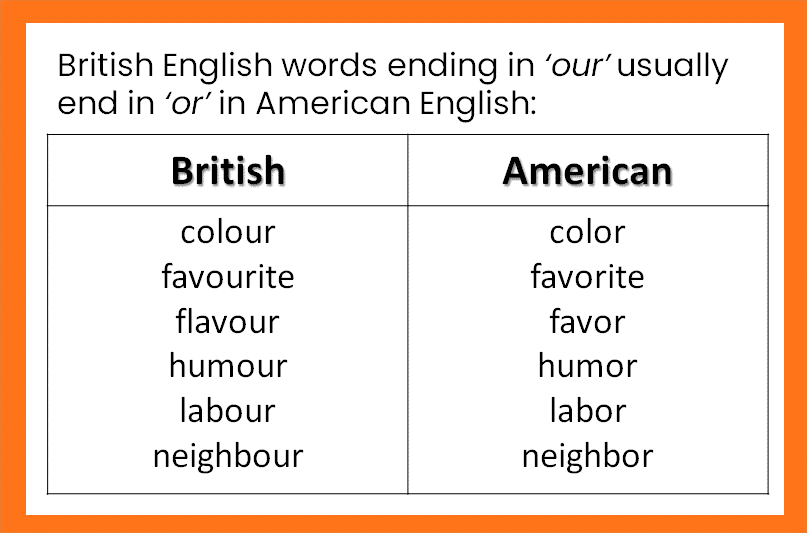
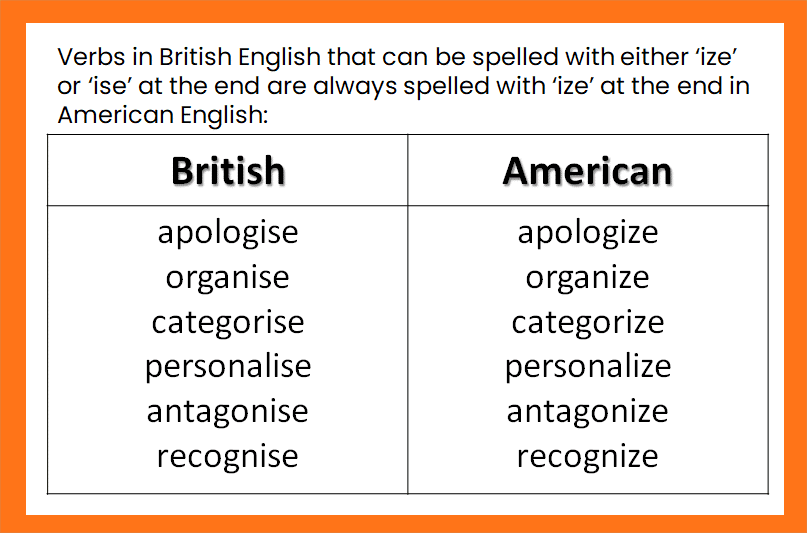
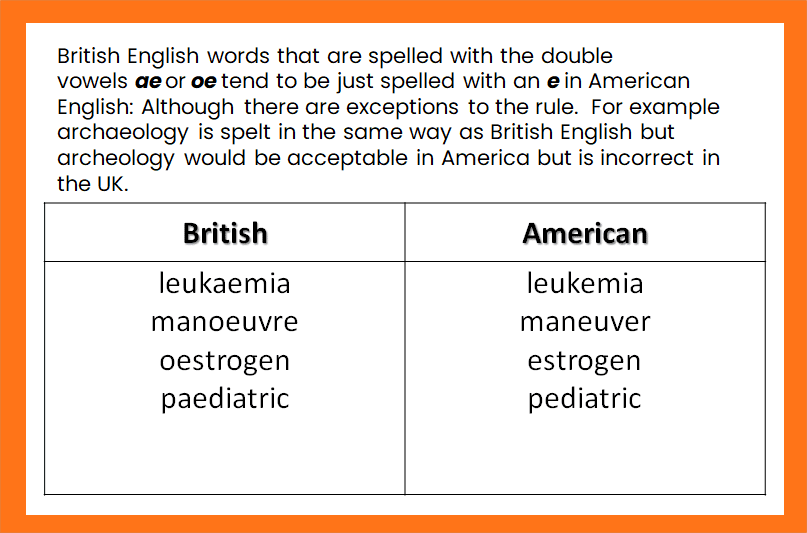
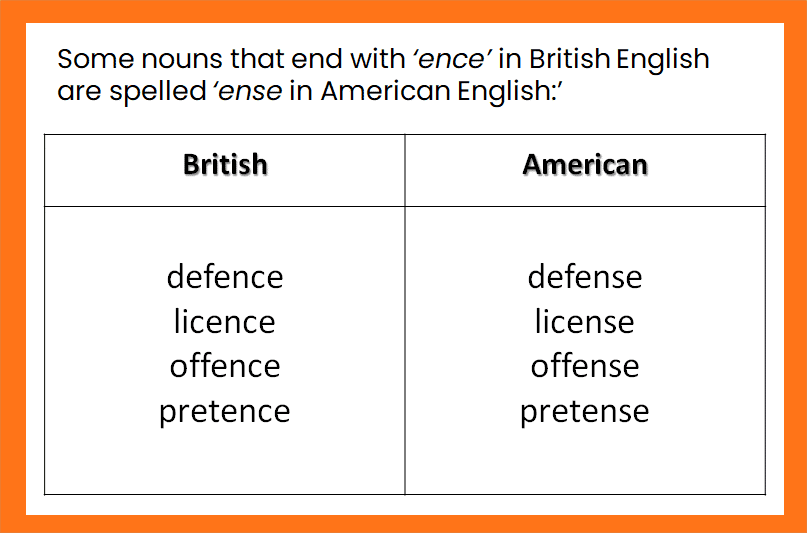
Don’t forget to learn some basic spelling standards. To help youngsters become better spellers, spelling rules are often taught in elementary schools. We remember these rules because they stay in our brains. It’s a great idea to review these guidelines now if you haven’t before.
There are many clever rules on the internet, so spend some time searching them up to discover which ones could be useful to you. Some of the most important rules to remember are listed below.
Top 7 Basic Spelling Rules
This is a difficulty that both native and non-native English speakers face. Test takers like you have encountered this difficulty spelling properly at some point in their lives. Even professional writers aren’t immune.
1. Vowel-Consonant-e Pattern
When a short word or the final syllable of a larger word ends in this form, the initial vowel is normally long, and the “e” is silent.
The exception is the vowel consonant E.
The vowel is usually long in a v-e syllable, and the last e is silent, as in /make/.
The /ive/ suffix is an exception to this norm.
Because the letter v does not appear at the end of a word in English, an “e” is added instead, but the vowel stays short.
Examples: mute, pile, male, kale, whale, write
2. I before E
The mnemonic rule of thumb for English spelling is “I before E, unless after C.”
If you’re not sure whether a word should be spelled with the digraph “ei” or “ie,” the rhyme indicates “ie” unless the previous letter is c, in which case it should be “ei.”
Examples: relieve, relief, reprieve, retrieve
If there is a c prior, the sequence will be: receipt, receive, ceiling, deceive, conceive.
3. E before I
For long a sounds, write e before i.
Examples: eight, weight, freight, reign
Alternatively, you can remember this: “i before e except after c,” or when sounding like a, as in neighbor and weight.
It is usually spelled ei when the ie/ei combination is not pronounced ee.
4. The ch sound
Use ch at the beginning of a word. At the end, use tch. You should use t after the ch sound when ure or ion follows.
Example: choose, champ, watch, catch, picture, rapture
5. Oi or Oy
To form the /oi/ sound, we use both “oi” and “oy” (think of the words “toy” and “oil”). We say “oi” when that sound occurs in the midst of a word.
We’ll use “oy” if it occurs at the end of the term.
Examples: boil, soil, toil, boy
6. Suffixes and Inflections
- Words that end with a silent e: Before adding a suffix that starts with a vowel, drop the e: state, saying; like liking.
- When the suffix starts with a consonant, keep the e: state, statement; use, helpful.
- If the final letter in a word is y, and the y is followed by a consonant, convert the y to I before adding any suffix other than those that begin with y: beauty, beautiful; fry, fries; lady, ladies.
- Add s to a word that ends in y and is followed by a vowel to get the plural: toy, toys; monkey, monkeys.
- Double the last consonant before adding a suffix that starts with a vowel when a one-syllable word ends in a consonant preceded by one vowel. This is known as the 1-1-1 rule, which stands for one syllable, one consonant, and one vowel! Bat, batted, hitting, batter, and so on.
- The same rule applies when a multi-syllable word ends with a consonant followed by one vowel, and the last syllable is accented: twice the final consonant. Control, controllable; start, start; start, start; start, start; start, start; start, start; start
- In certain situations, it is suggested not to double the consonant when the last syllable does not carry the end-accent. Focus, worship, worshipped are some examples.
6. Remember that: TYPOS are Grave Errors!
Keep an eye out for typos (typos).
If you choose a computer-based IELTS exam, you must exercise extreme caution while typing. You would never write ‘teh‘ or ‘and’ for ‘the‘ or ‘and,’ right?
When typing fast, though, it’s easy to make this error. You should become a proofreader and go over your work to ensure you haven’t made any typos.
Each of these typos is an honest mistake that will be treated as a spelling mistake, so be careful and practice typing correctly.
7. Practice Makes Perfect.
We all know that practice is vital. Practicing spelling terms you may need or new words you’ve learned can help you recall them.
Spellcheck fixes most of our mistakes. Therefore deactivate it in Word if you genuinely want to improve your spelling. Write down a list of challenging words and then activate the function. You will then discover whether you committed errors.
Spelling words properly requires repetition of the process of saying the word, writing it, and verifying it.
Try spelling all of these often misspelled words to see if you can get 60/60.
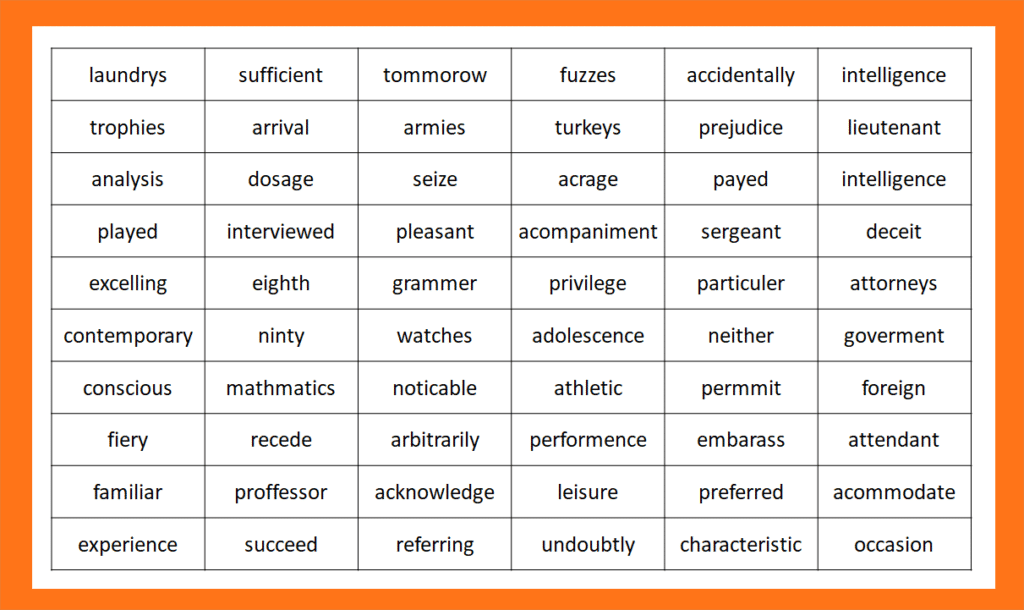
Commonly Misspelled Words:
This is a list of difficult-to-spell terms that include their correct spelling and frequent misspellings. For British English and American English, these spellings are the same.
Here are the commonly misspelled words that you should be familiar with.
| absence | excellent | pneumonia | committee | interrupt | similar |
| accidentally | excitement | possess | conscience | judgment | sincerely |
| accommodate | experience | practically | convenience | leisure | straight |
| achieve | familiar | preferred | courageous | library | strengthen |
| acquaintance | fascinate | privilege | criticize | lightning | studying |
| against | favorite | probably | decision | lonely | summarize |
| a lot | February | raspberry | definitely | lying | surprise |
| already | finally | realize | desperately | millionaire | thorough |
| argument | foreign | receive | dictionary | mischievous | tomorrow |
| attendance | friend | recommend | different | necessary | truly |
| because | government | remember | disease | niece | until |
| beginning | grammar | restaurant | doesn’t | noticeable | vacuum |
| believe | guarantee | rhythm | embarrass | occasion | vegetable |
| business | height | ridiculous | enough | occurred | Wednesday |
| calendar | immediately | schedule | environment | opposite | weight |
| cemetery | independent | scissors | especially | particular | weird |
| chief | instead | separate | exaggerate | physical | yacht |
4. Vocabulary
If you want to improve your language learning skills, you’ll need to expand your vocabulary. Understanding vocabulary and understanding how to use and write them properly is crucial to doing well on the Duolingo English Test Reading and other sections.
The DET evaluates your ability to comprehend what you hear, read, and understand, but it will be recorded as wrong if your response is misspelled.
Is good vocabulary essential in the DET? It’s all about the words in the language. It’s best if you know as many words as possible. You will have no issue comprehending English after you have learned additional vocabulary.
Because they do not grasp the language, most pupils struggle in reading, writing, speaking, and listening assessments.
Hence, you must learn how to expand your vocabulary. You will explain your ideas, feelings, and emotions perfectly if you know the words. You will have no difficulties.
To widen your vocabulary words in the Duolingo English Test:
- Look for new terms in your daily activities, such as reading the newspaper, watching a movie, or listening to someone talk; keep an eye out for words you haven’t heard before. And when you do, don’t go straight to the dictionary. Take some time to infer the meaning of a term from the context in which it was used, then double-check your work using a dictionary to be sure you’re on the right track. If you don’t know what it means, simply add it to your collection of new terms.
- In a notepad, write down all new terms, including their definitions, synonyms, collocations, antonyms, and pronunciation.
- Mnemonics are a great technique to learn and practice new words. As long as the foreign terms do not register in your memory, use them regularly in your speech or writing, and they will eventually become a part of your Duolingo English Test vocabulary.
Word Forms
Many English words have four forms: verb, noun, adjective, and adverb.
The four forms are found in many words; however, some do not. Some freshly invented terms, such as ‘avatar,’ ‘captcha,’ and ‘selfie,’ are only available as nouns.
Many words may be classified as nouns, verbs, adjectives, or adverbs. For example, the chart below shows a handful of these word form families. You may find the different forms of a word in any reputable dictionary.
| Verb | Noun | Adjective | Adverb |
|---|---|---|---|
| admit | admission | admissible | admittedly |
| beautify | beauty | beautiful | beautifully |
| brighten | brightness | bright | brightly |
| clean | cleanliness | clean | cleanly |
| collect | collection | collective | collectively |
| complete | completion | complete | completely |
| continue | continuity | continuous | continuously |
| create | creation | creative | creatively |
| differentiate | difference | different | differently |
| excited | excitement | excite | excitedly |
| graced | grace | graceful | gracefully |
| heal | health | healthy | healthily |
| initialize | initial | initial | initially |
| quicken | quickness | quick | quickly |
| rely | reliable | reliability | reliably |
| sadden | sadness | sad | sadly |
| strategize | strategy | strategic | strategically |
| strengthen | strength | strong | strongly |
| succeed | success | successful | successful |
| thank | thank | thankful | thankfully |
| use | usage | useful | usefully |
| weaken | weakness | weak | weakly |
Prefixes
Prefixes help you figure out what a word means. While some prefixes have just one meaning, others may have several meanings or multiple prefixes that have the same purpose. It’s a scenario that contributes to the English vocabulary’s diversity.
| Prefix | Usage | Example |
|---|---|---|
| a-/an- | without | amoral, anarchy |
| ad- | to, toward, near | adhere, advert |
| ante- | before in time or order | antechamber, antecedent |
| anti- | against, opposed to | antiaircraft, antibiotic |
| bene- | good | beneficial, benefactor |
| bi- | two | bicycle, bipolar |
| by- | aside or apart from | bystander, byproduct |
| circum- | around | circumpolar, circumnavigate |
| contra- | against, opposite | contraception, contraband |
| de- | down from, away, off | descent, declassify |
| dia- | across, through | diagonal, diagram |
| dis- | away from, apart | disconnect, disown |
| epi- | upon, above, outside, in addition to | epidermis, epilogue |
| ex- | out of, thoroughly | exhale, exasperate |
| hyper- | beyond, excessive, extreme | hyperbole, hyperactive |
| hypo- | under, beneath, down, less than | hypodermic, hypothesis |
Suffixes
The tables below include the most frequent suffixes for nouns, verbs, adjectives, and use and examples.
Adverbs have just one regular suffix, and that is -ly. It’s often used with adjectival suffixes like creative and creatively.
| Suffix | Usage | Example |
|---|---|---|
| -ise | to create/transform into something | stabilize, symbolize, prioritize |
| -ate | to behave in a certain way; | duplicate, liquidate |
| -fy | Making into is described as a process. | classify, modify, simplify |
| -en | to develop/increase | widen, shorten, strengthen |
| -ment | the state of | argument, government, punishment |
| -ist | someone who | chemist, racist, plagiarist |
| -ism | doctrine, conviction | communism, feminism, skepticism |
| -sion, -tion | condition of being | concession, transcription, abbreviation |
| -ship | held a position | fellowship, scholarship, kinship |
| -dom | condition of being | freedom, boredom |
| -ness | condition of being | heaviness, sadness, testiness |
| -ity, -ty | the standard of | inactivity, veracity, parity, serenity |
| -ance, -ence | quality or situation | maintenance, eminence, assurance |
| -acy | quality or situation | privacy, fallacy, delicacy |
| -al | the act or the process of | refusal, recital, rebuttal |
| -er, -or | someone who | trainer, protector, narrator |
| -ward | in a certain direction | backward, wayward, awkward, afterward |
| -ly | what is being done and how it is being done | bravely, simply, honestly, gladly |
| -wise | when it comes to | clockwise, edgewise, lengthwise, otherwise |
Understanding Context
In the Duolingo English Test, guessing meaning from context is an essential method that can help you improve your reading abilities and speed. And, answer the Read, then Complete test question.
You will not have a dictionary with you throughout the test. Thus there will be many terms from the reading material that you will not verify.
Improve your Meaning Through Context Clues. These are cues provided by an author to aid in the definition of a problematic or unique term in a book.
The clue might be in the same phrase as the word it relates to, or it could appear in the next sentence. Because we learn most of our vocabulary via reading, we must notice and apply context cues.
These are four different types of context hints that are often used:
- Synonym: An author will use more than one term that implies the same thing as a synonym. In the same or subsequent phrase, for example, a complicated term may be followed by a restatement using a simpler word:
Felipe is a scrooge. He's always been a bargain hunter.
- Antonym: A word or words with the opposite meaning may appear in the text, revealing the meaning of an unfamiliar term:
Stella has always been a bold dresser. I've never seen her in a drab outfit.
- Explanation: An unfamiliar term is defined inside the phrase or shortly after it:
We went to the arboretum on Friday, a landscape devoted to displaying trees and plants.
- A specific example: One or more examples are given in the text to define the term:
Crabs, lobsters, and shrimp were among the crustaceans seen by the youngsters.
How to Improve Your English Reading Skills?
You may enhance your reading abilities in several ways. Try speed-reading or taking notes whenever you come across an unusual language to increase your fluency. The following steps will also detail what you may do to strengthen and grow your reading abilities.
1. Make Time to Read Every Day
Practice is one of the most effective strategies to improve your abilities. It will take time and effort to enhance your reading abilities, but you may set aside at least 15 minutes each day to read. You may read anything, including news stories, fiction, magazine issues, and other types of texts, as long as you develop your reading abilities.
2. Establish Reading Objectives
You may create reading objectives for yourself to help you expand your vocabulary, obtain a better grasp of diverse texts, and enhance your ability to link what you read to your thoughts and ideas.
You may, for example, make a goal to acquire new terminology connected to a primary topic such as business management, technology, or another subject that interests you. Then, while you read, you may look up definitions for uncommon terms to help you expand your vocabulary. You may adjust the difficulty level of the texts you read as your vocabulary grows to higher-level words and phrases.
3. Get a Sneak Peek at The Texts You’ll Be Reading
Another step in improving your reading abilities is to preview and scan materials. This method may be used by looking at titles, captions, headlines, and other text characteristics to understand what you’re reading. This might assist you in forming key concepts about the book before beginning to read it.
4. Decide on The Goal
Practice identifying the aim of various texts as you read them. You could also specify why you’re reading, such as gathering information, following directions in a handbook, or just enjoying a narrative. Knowing why you’re reading a document might help you hunt for crucial ideas and information that can help you achieve your goal.
5. Use Important Reading Methods
You may use a few essential tactics to help you improve your comprehension when you read diverse books.
For example, when previewing a piece, you could recognize the text structure as informative, persuasive, or educational.
Key features of diverse texts, such as primary themes, problems, solutions, or comparable concepts conveyed in what you read, may also be determined. Identifying text elements, recognizing the goal, and taking notes are all tactics that may help you enhance your reading abilities.
6. Keep Track of What You’re Reading
Taking notes while reading is another incredibly efficient strategy for enhancing your reading abilities. For example, when reading a fiction book, you may take notes to better grasp the author’s language choices, or while reading a scientific magazine, you might jot down new words. When you take good notes, you’ll be more likely to ask questions and create connections regarding what you’re reading.
Similarly, visual representations such as charts, tables, and diagrams may help you comprehend themes and concepts and develop conclusions based on your reading. Note-taking is also useful for comprehension skills such as summarizing.
7. Summarize What You’ve Learned
Reading abilities may also be improved by summarizing what you’ve read.
Summarizing challenges you to recall key information and essential themes from what you’ve read in your own words and from your unique point of view. You may try vocally summarizing what you read with a friend or writing a summary to assist you in remembering and grasping what you read.
Sample Duolingo English Test Reading Questions with Model Answers
These topics may help you in the Duolingo English test, based on the Duolingo English Test reading question type. Practice these questions and time yourself based on any reading question types.
Read and Complete
Practice 1
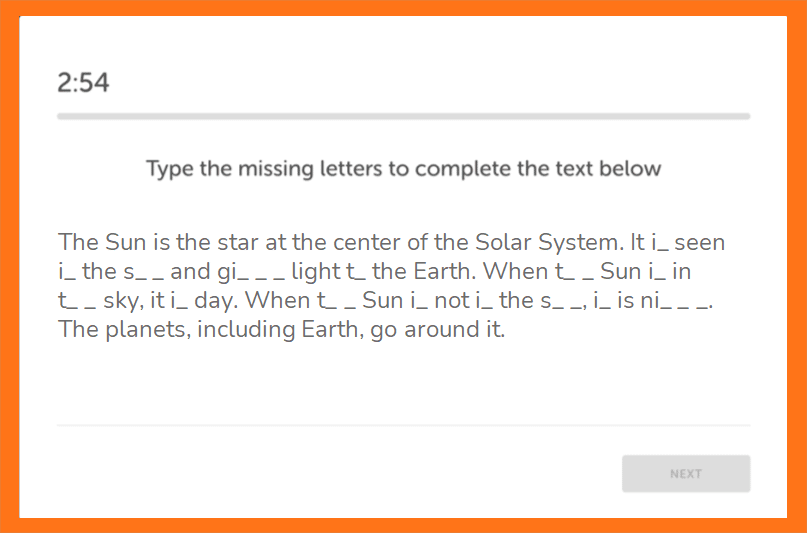
Practice 2
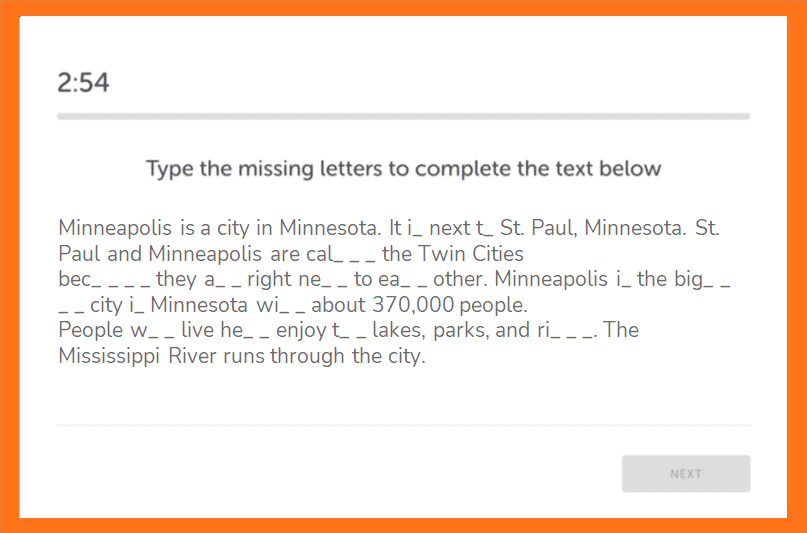
Practice 3
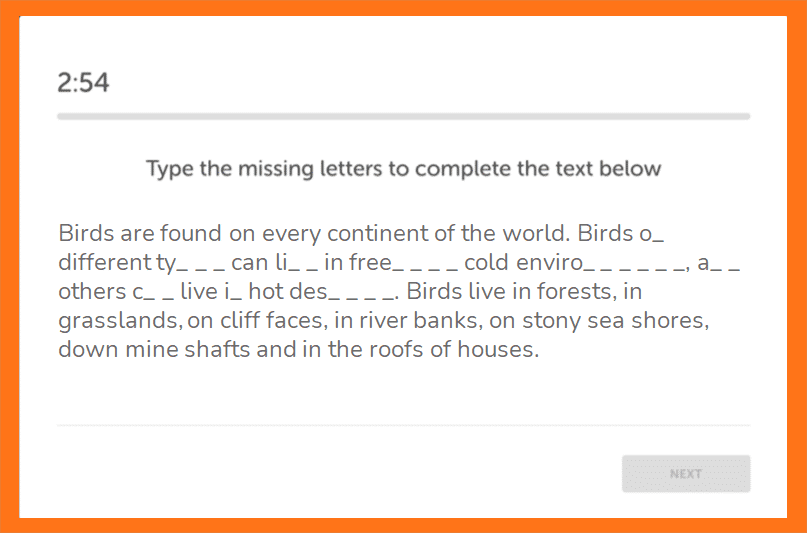
Model Answers for “Read and Complete” Practice Questions
Model Answers for Practice 1

Model Answers for Practice 2

Model Answers for Practice 3

Read and Select
Practice 1
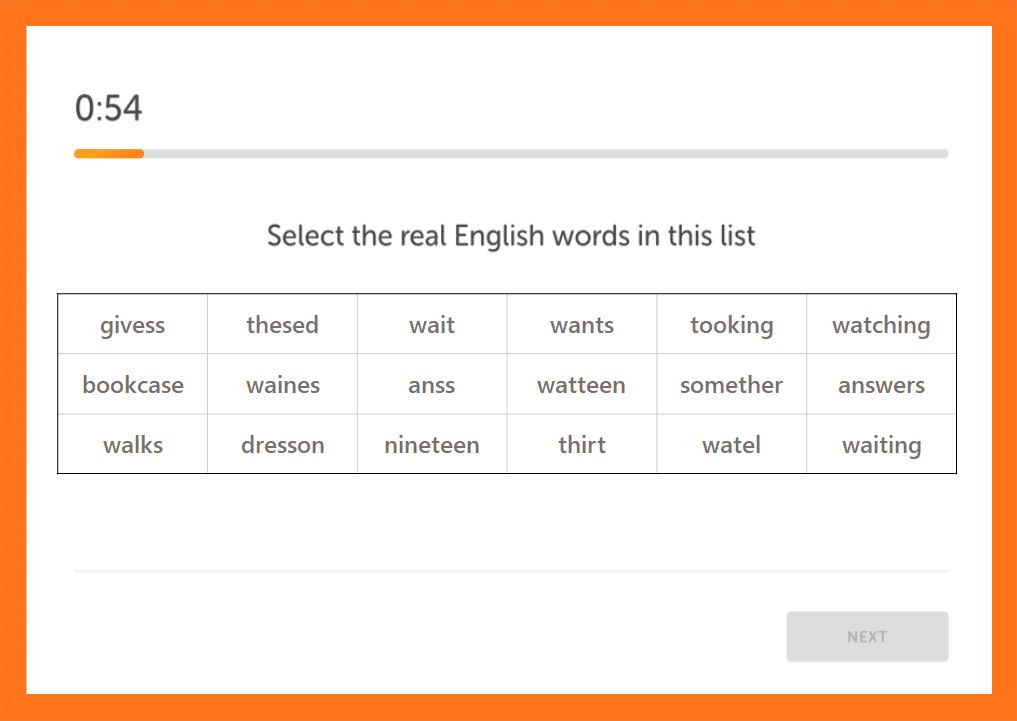
Practice 2
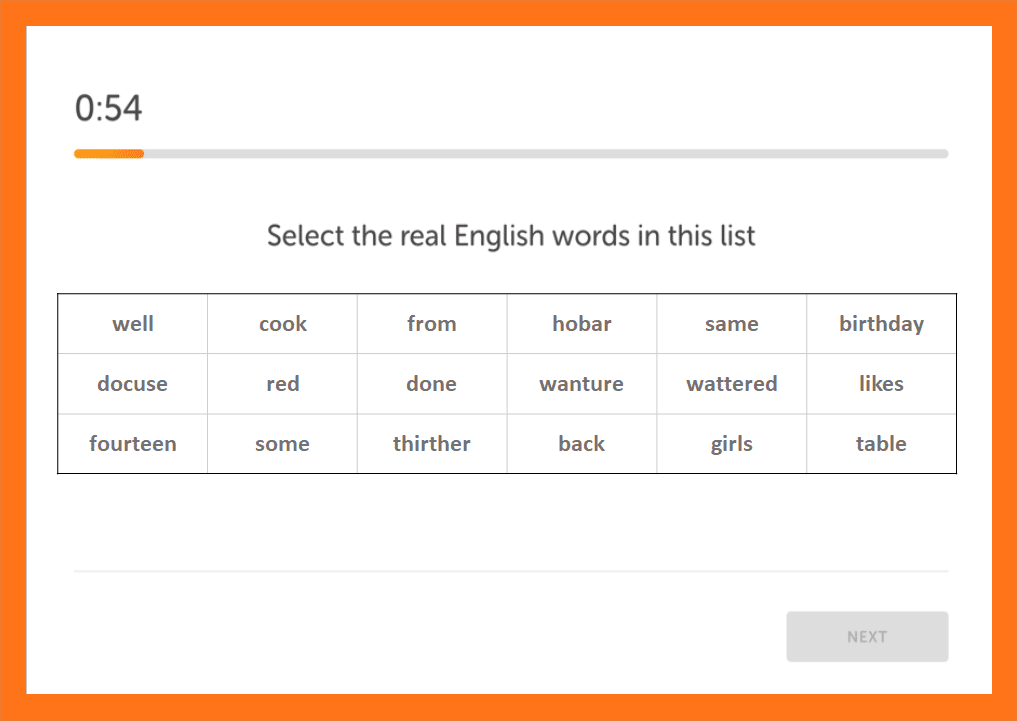
Practice 3
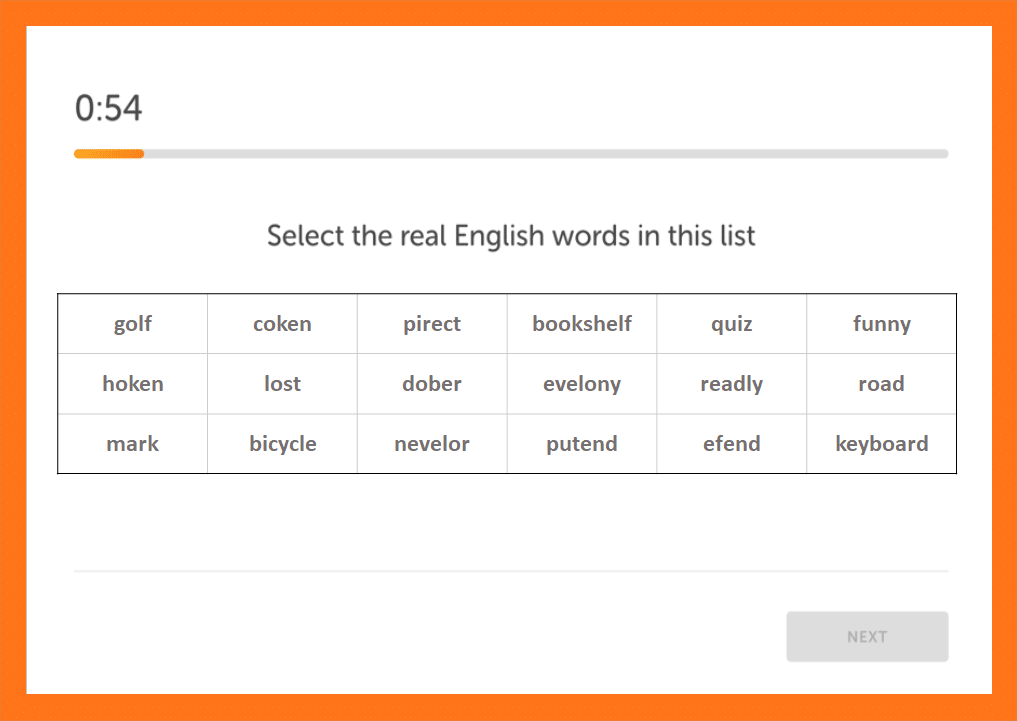
Correct Answers for “Read and Select” Practice Questions
Correct Answers for Practice 1

Correct Answers for Practice 2

Correct Answers for Practice 3

Read Aloud
Practice 1
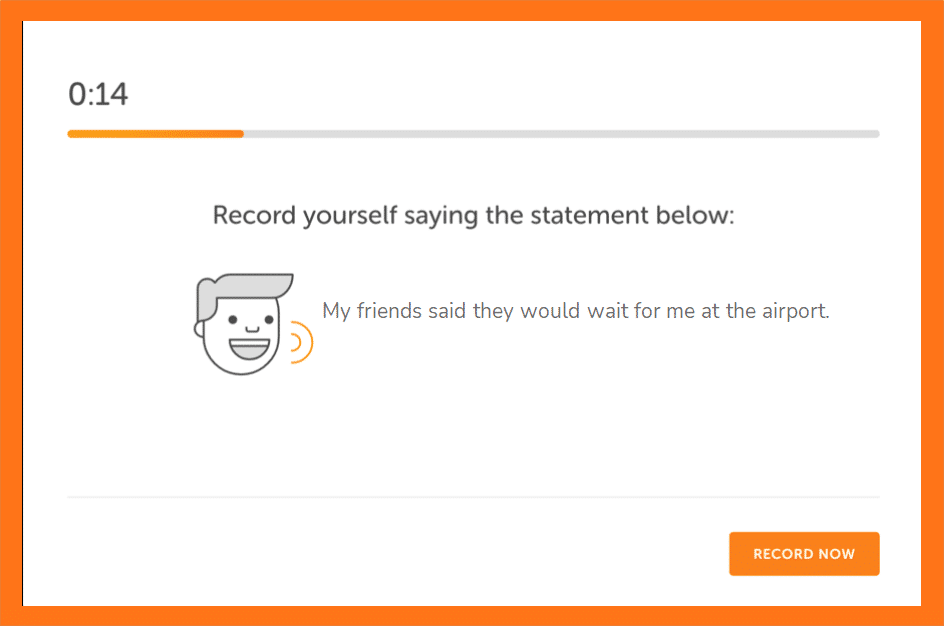
Practice 2
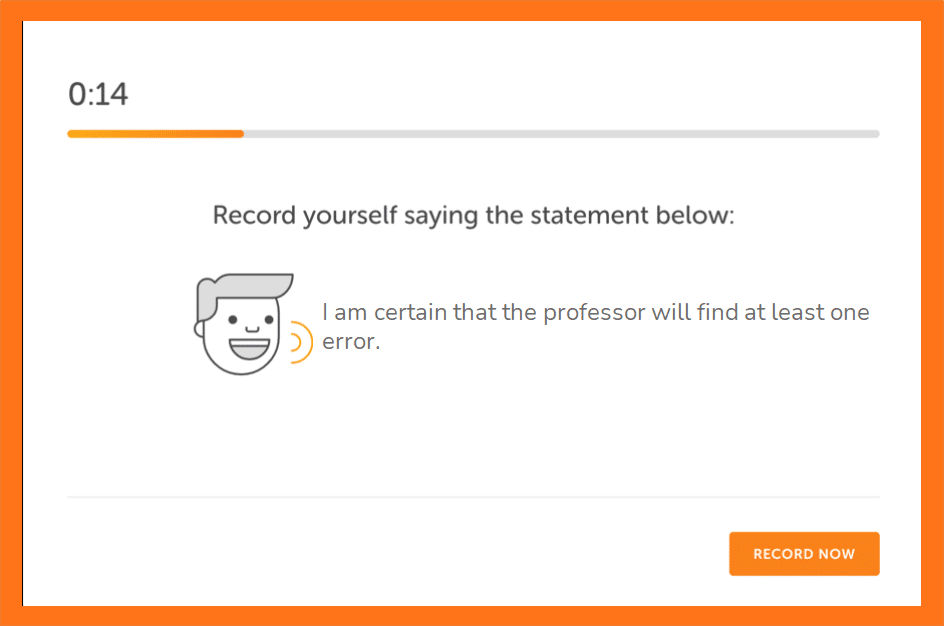
Practice 3
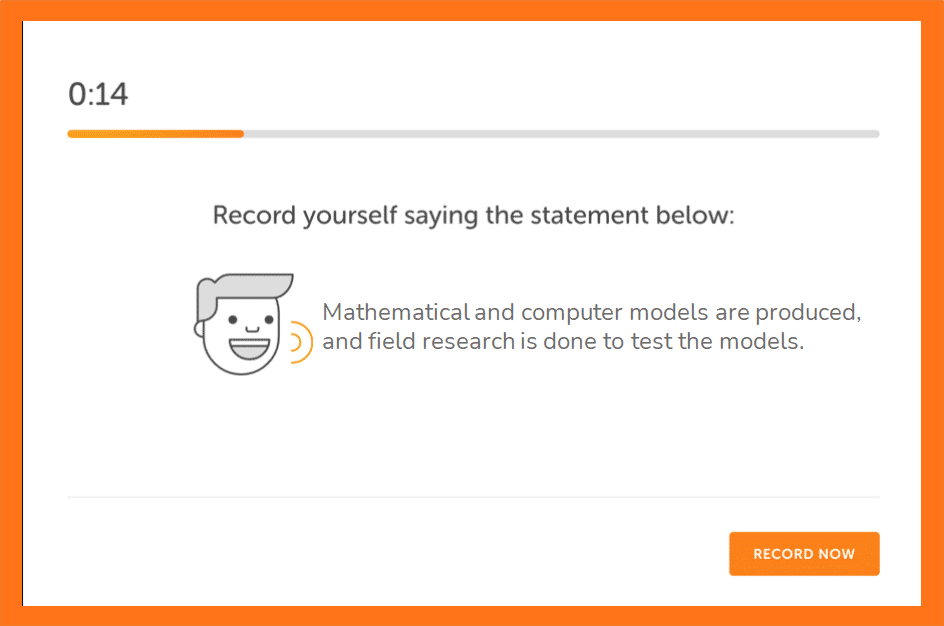
Read, Then Write
Practice 1
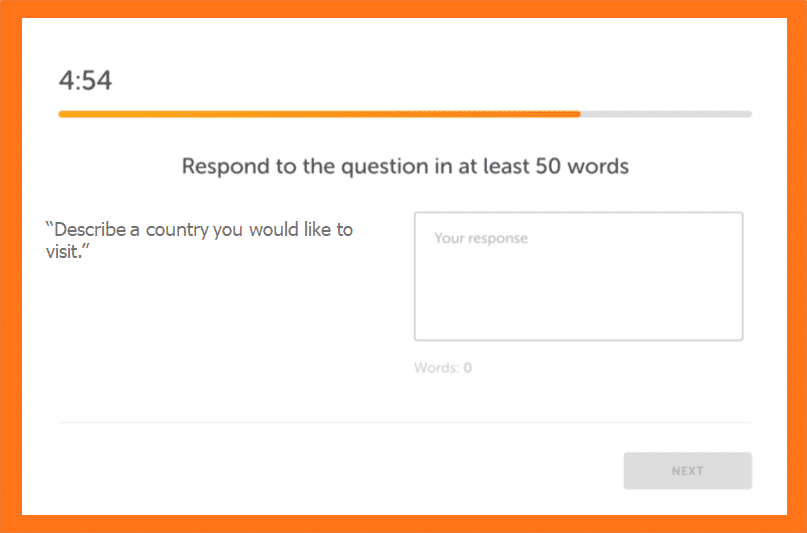
Practice 2
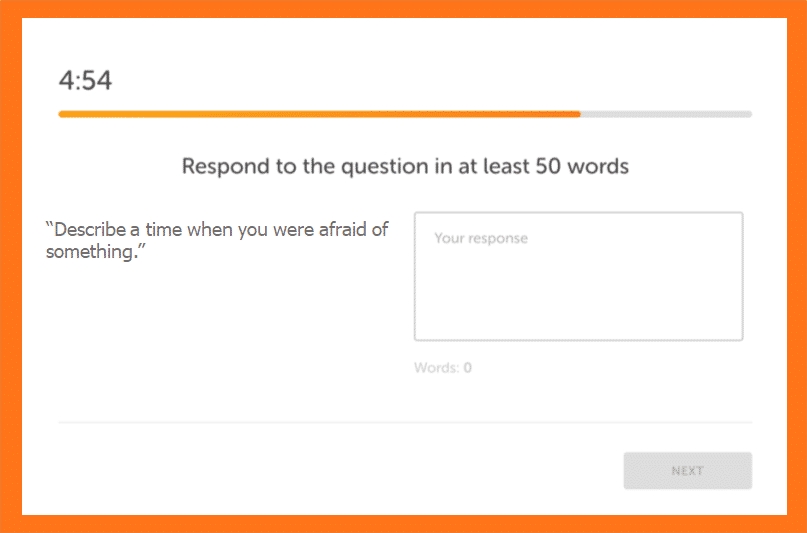
Model Answer for “Read, Then Write” Questions
Model Answer for Practice 1
"In my curious mind, I want to go to every place on the globe, but I don't have unlimited funds or time to do it. So, to put my aspirations into perspective, I want to visit 5-6 countries in the next couple of years, with Switzerland at the top of my list. Switzerland is undeniably one of the world's most beautiful nations, and I'm always amazed by the wide-green pastures and snow-capped mountains I see on TV or in publications. My school buddy who lives there with her family piqued my curiosity about the country. I've heard about her skiing in the mountains, adventures in the countryside, and culinary adventures. But even though they are simply tales and experiences, they sparked my imagination about how lovely and fun it would be to explore. If everything goes well, I'll be in Switzerland in the middle of next year. My parents had previously approved of my plans to vacation there with a close buddy. So, I may visit this nation known for its heavenly beauty, delectable chocolates, and magnificent watches with Elizabeth. Visiting Switzerland would be an unforgettable experience for me. It will be full of thrilling experiences and will fulfill my desires. I've also heard great things about Swiss timepieces and Swiss people's timeliness. While in Switzerland, I want to appreciate the stunning scenery, culture, gastronomy, and traditions."
Model Answer for Practice 2
"Fear is, I think, a human reflex to escape danger. We are afraid of the same things our predecessors were, even when we believed we had overcome darkness and hidden dangers. But, as humans, we are constantly afraid of the unknown, as I was, along with billions of others, when Covid-19 was proclaimed a worldwide pandemic. The lockdown, which was akin to a curfew, was established in March 2020 to limit the spread of the Coronavirus, which had killed so many people globally. The first two weeks were difficult but manageable, given the new circumstances and our new routine. But after a few weeks, as the number of positive tests and deaths increased, I felt scared. The news of neighbors affected by this incurable and frequently lethal infection exacerbated the situation. I panicked; the psychological strain was too great. I was worried about the circumstances, my parents' age, the possibility of getting infected by the Coronavirus, and the rising financial pressure. This was perhaps the only time I felt confined and helpless for weeks on end. It was a predicament that only our wildest fears could match"
Read, Then Speak
Practice 1
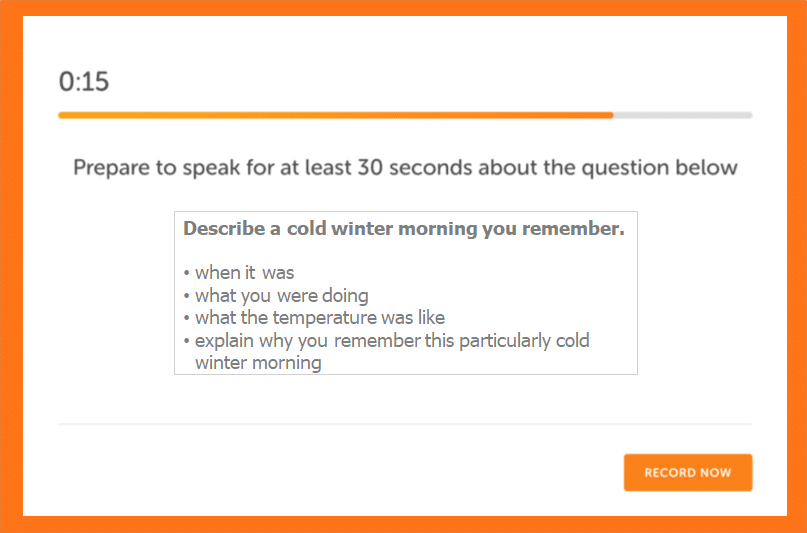
Practice 2
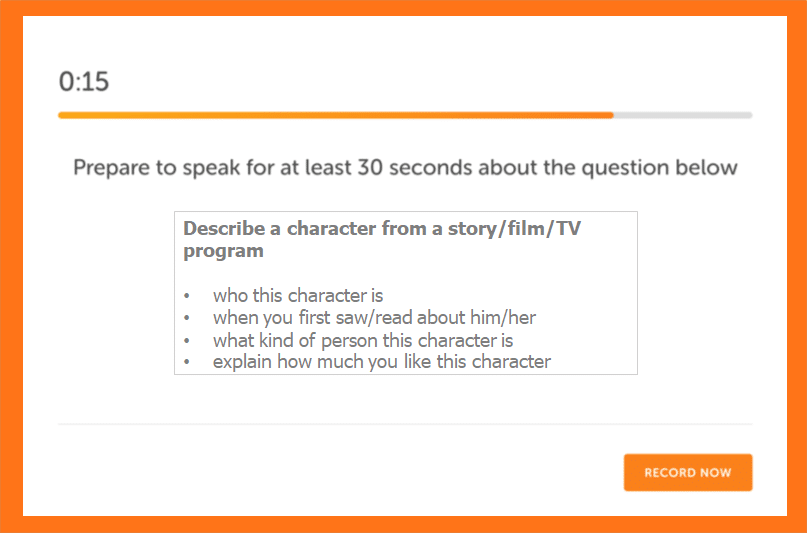
Practice 3
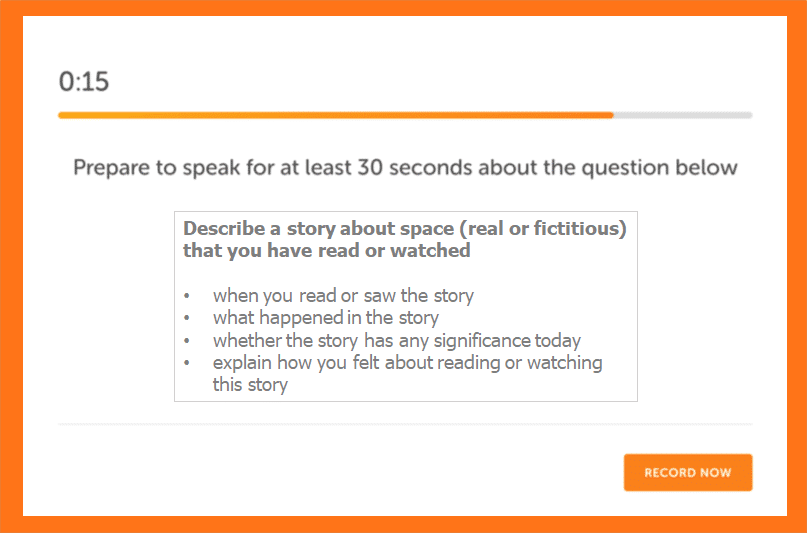
Model Answer for “Read, Then Speak” Practice Questions
Model Answer for Practice 1
"To be honest, recalling a chilly winter is one of my least favorite things to do, simply because I strive to avoid winter as much as possible. However, no matter how far I attempt to flee, I am forced to endure “the bite” of winter almost every year, just as I was a few years ago. Like I've said, winter is not my favorite season. But, just as it didn't care whether I liked it or not when I needed to pick up my aunt from the airport in mid-December, I'm sure Mother Nature doesn't care whether I like it or not. As soon as I awoke and glanced out my window, I knew it was going to be a cool morning. I could see fog enveloping the terrain above ground, indicating that it would be a chilly morning. I pondered waiting till the sun came out but decided against it since the delay would irritate my aunt. As a result, I got a cab. I struck the road after donning a variety of thick clothing to defend myself from the onslaught of a chilly winter morning, as the temperature was likely as low as minus 5 degrees Celsius on that particular day. However, when I arrived at the airport, I learned that the aircraft had been delayed for almost two hours due to poor visibility in the sky. Because the airport administration had denied us entry to the arrival lounge for security concerns, I had no choice but to wait at the airport in the cold until my aunt arrived. So, why do I recall that freezing winter morning? I remember this particular winter morning because it was very chilly for me. Furthermore, traveling to the airport and waiting for about two hours in the freezing weather was a distressing experience for me. Finally, I remember it because there was a lot of fog in the air that day, and I was frightened about getting into an accident due to the poor visibility on the road."
Model Answer for Practice 2
"Because I am a movie buff, I have fallen in love with many characters so far. I want to talk about Juliet today since she has made a lasting effect on me both in terms of beauty and traits. She is a brilliant actress who appeared in Shakespeare's earlier play, Romeo and Juliet. In truth, she is a really well–developed character, complete with genuine emotions and personality traits. In Verona, Italy, the tale of Romeo and Juliet takes place, and it's a particularly tragic love story because of the animosity that exists between two significant families: the Montague and the Capulet. In the beginning, I was surprised by how deeply Juliet feels for Romeo and how she fights against the wishes of her whole family to safeguard her love for him. But then I observe that Juliet does not begin the novel as this confident young woman; instead, she undergoes a transformation throughout the story. She was 13 years old when we first met her; she was quiet and generally did what her parents wanted her to do. She had a good sense of humor. Nonetheless, at the conclusion of the film, she has matured into a young woman who is not afraid to stand up for her own personal beliefs. I believe that the powerful and attractive Juliet is the character responsible for the popularity of this love tale."
Model Answer for Practice 3 (Short Answers)
1. "I recently saw a film about space that I really liked. I saw the movie last weekend in the afternoon. The narrative revolved around an extraterrestrial communicating with a human, and the two eventually fell in love. I believe the narrative is unimportant now, but it may become so in a few years if the presence of aliens is proven. However, after seeing the film, I was intrigued. I was moved by the conclusion."
2. " I read a book on aliens and their existence. It was a work of fiction, and the storyline was designed to delight the audience. Some aliens descended onto the planet and assumed the form of humans. They did, however, possess certain exceptional abilities. They also averted a calamity for several people. In the current context, I believe the narrative is relevant. In truth, we need assistance from outside sources in order to survive in the face of global instability. On the final page, there was a narrative that I really liked."
3. "On Monday, I read an article in the newspaper. It was a fantastic narrative about an extraterrestrial substance. During a lunar orbit, the protagonist heard a strange noise on the moon. When Apollo 10 was sent to the moon in 1969, the crew heard some whistling music. The sound is also recorded. Today, the narrative is still relevant. It will assist in the discovery of extraterrestrial life. I was blown away by the narrative."
4. "Two Sides of the Moon was an intriguing novel. During my final summer vacation in Paris, I read the book. For technological reasons, landing on Earth from space is often challenging. The author ran into this problem and ended up in a remote location. For him and his crewmate, surviving was a challenge. The tale has a lot of weight behind it. The easiest method to deal with it is to repair any possible technical issues. Reading the author's experiences enthralled me."
Duolingo English Test Practice Reading Questions
As you work on these practice questions, time yourself properly and see where else you have to improve.
Read, then Complete
Practice 1
Subways are also home to rats, as most res _ _ _ _ _ _ of New York City and any c_ _ _ with a su_ _ _ _ system are a_ _ _ _. There have been st_ _ _ _ _ of rats entering tr_ _ _ _ on oc_ _ _ _ _ _, but for the most part, ro_ _ _ _ _ remain on the tracks—subway personnel I’ve spoken with refer to rats as “track bunnies.” People often b_ _ _ _ _ _ that the subways are in_ _ _ _ _ _ with rats, but this is not the case; rats t_ _ _ _ _ in the subways based on the av_ _ _ _ _ _ _ _ _ _ of abandoned human food and se_ _ _ _ leaks.
Practice 2
Foods high in nu_ _ _ _ _ _ _ such as fibre, po_ _ _ _ _ _ _ , and minerals are k_ _ _ _ as power f_ _ _ _. With individuals be_ _ _ _ _ _ more h_ _ _ _ _ -conscious, many f_ _ _ _ _ _ trainers a_ _ _ _ _ their customers to i_ _ _ _ _ _ _ _ _ _ these items in their e_ _ _ _ _ _ _ diets to help them build muscle. Power foods may be i_ _ _ _ _ _ _ into your everyday diet in a variety of ways.
Practice 3
Some of the s_ _ _ _ _ _ _ _ power food co_ _ _ _ _ _ _ _ _ _ are ones that we c_ _ _ _ on a daily b_ _ _ _ in our k_ _ _ _ _ _ _. Take the m_ _ of chickpeas and onions, for example. This combination is a rich s_ _ _ _ _ _ of iron, which the b_ _ _ needs to d_ _ _ _ _ _ oxygen to all of its o_ _ _ _ _. Anemia, w_ _ _ _ _ _ _ _, brain fog, and e_ _ _ _ _ _ _ _ _ are all symptoms of iron d_ _ _ _ _ _ _ _ _.
Practice 4
Female sparrows t_ _ _ _ _ _ _ _ lay four to six eggs each c_ _ _ _ _. The eggs are re_ _ _ _ _ brown in color w_ _ _ white dots. It takes eleven to fourteen days for them to h_ _ _ _ _. Both male and female p_ _ _ _ _ _ look after their ch_ _ _ _ _ _. After ha_ _ _ _ _ _, the young are fed insects. The birds’ big feet are u_ _ _ _ _ _ _ for scratching seeds. Adult sparrows c_ _ _ _ _ _ _ mostly seeds. Sparrows may be f_ _ _ _ _ practically wh_ _ _ _ _ _ that people exist. These lovely birds are loved by many people all around the globe.
Practice 5
Chimpanzees show a lot of c_ _ _ for one an_ _ _ _ _. When chimps re_ _ _ _ _ after a long se_ _ _ _ _ _ _ _, they wel_ _ _ _ each other in a very human ma_ _ _ _, caressing or cl_ _ _ _ _ _ hands. Chimpanzees have in_ _ _ _ _ _ _ _ social skills. When a do_ _ _ _ _ _ male enters, the other chimps rush to show their admiration. It is fo_ _ _ _ _ _ _ for the dominant man to take food from his su_ _ _ _ _ _ _ _ _ _.
Practice 6
Regardless of the h_ _ _ _ _ _, it is not un_ _ _ _ _ _ to see ind_ _ _ _ _ _ _ _ listening to music or using el_ _ _ _ _ _ _ _ devices while cro_ _ _ _ _ busy highways or on public tr_ _ _ _ _ _ _ _ _ _ _ _ these days. I’ve long wondered why people take such risks: do they want to project an air of in_ _ _ _ _ _ _ _ _ _, or do they want to u_ _ _ the world to stop b_ _ _ _ _ _ _ _ them? Or are they simply tr_ _ _ _ to show off how aw_ _ _ _ _ they are? Earphones have become an ind_ _ _ _ _ _ _ _ _ _ part of our life, whether we are workers or executives, and have even led to tragico circumstances.
Read and Select
Practice 1
| autenhtic | fanary | specking | missinform | compolity | thrive |
| besides | shot | enking | pose | smulde | reoling |
| candidate | functional | outright | outspect | jeap | investigation |
Practice 2
| carculous | astronomy | frait | coherent | mediocrity | rigulate |
| chender | disabled | sharp | spility | leaviduant | listener |
| converty | tumpine | violate | grumpy | loadine | appliance |
Practice 3
| dismay | riticity | element | consection | explicit | tenderness |
| forial | negligible | hypocrissi | nostalgia | detrimental | traumatic |
| formanly | missivery | swave | hobbian | retime | frame |
Practice 4
| jealon | varie | registration | fancially | useral | incide |
| kidly | talent | amount | bucket | prinanter | countryside |
| layer | rivition | bease | eviddently | overtake | string |
Practice 5
| nest | vitality | crapil | totalitarian | underway | remore |
| pipe | click | allows | silhk | despite | scientific |
| regain | strategically | outles | merout | feasured | interpt |
Practice 6
| trovern | redictor | assummption | troughtle | leuts | scramaging |
| venious | realia | conseal | drair | anemomie | scattered |
| whipp | faint | educcational | breathely | phase | calmly |
Read Aloud
Practice saying these aloud
- She works full time at the library.
- My siblings said they would wait for me at the cafeteria.
- I am sure that the supervisor will find at least one error.
- Life is like a box of chocolates, you will never know what you will get.
- Reports and recommendations are produced, and field research is done to test the models.
- By the time you make up your mind on what to do, I will have already left for the movies.
Read, Then Write
Time yourself as you write any of these prompts:
- Describe an example of an aquatic animal.
- Describe a state in which you had to rely on your imagination.
- Describe a memorable hotel you visited.
- Describe a little trip you often take but dislike.
- Describe a popular exhibition that you frequent.
- Describe someone who dresses in odd clothing.
Read, Then Speak
Practice 1
Describe a phrase from a poetry or song that you recall
- What is the phrase and who authored it?
- What do you know about it?
- How do you feel about it?
Practice 2
Describe one of your country’s traditions
- What is it?
- Who participates?
- What activities are available?
- How do you feel about it?
Practice 3
Describe someone you believe is particularly open
- Who is this person?
- Why do you believe this person is so open?
- How do you feel about them?
Practice 4
Describe a long-lost buddy with whom you just reconnected.
- Who is he or she?
- How did you make contact?
- Also, describe how you felt about it.
Practice 5
Describe a family you like and are pleased to know.
- Who are they?
- Where do they live?
- How did you get to know them?
- Why do you like them?
Practice 6
Describe a lively person you know.
- Who is this person?
- How did you come to know this individual?
- Why do you believe this individual is energised?
- Also, express how you feel about this individual.
Practice 7
Describe a costly hobby or pastime that you love pursuing on occasion.
- What is it?
- Who do you do it with?
- Why is it so costly?
- How do you feel about it?
Additional FAQs about the Duolingo English Test Reading Questions
What is the Degree Of Difficulty Of The Duolingo English Test Questions?
Since Duolingo is less time-consuming than IELTS, solid language abilities are required to answer the questions within the time limit. Any test’s difficulty level is subjective, yet Duolingo is on par with the other two English language competence examinations, the IELTS and the TOEFL.
The Duolingo English Test is adaptive, so it takes less time to establish your competence level than a fixed-form exam. It ranges from simple to moderate in complexity, and as you respond to each question, the more difficult it will be. The DET will ask you several questions in each area, such as listening, reading, writing, and speaking. Some questions may be challenging, while others may be simple.
What Does the Duolingo English Test’s Session Timeout Prompt Choice Mean?
The session timed-out notice might appear when the internet connection is slow, indicating that the questions take longer to load. In this scenario, you should retake them using a faster internet connection.
With this, take the DET as many times as you wish, as long as you don’t take it more than twice in 30 days. In the meanwhile, you may take the TOEFL as many times as you like as long as you don’t take it more than once every three days.
What are the Types of Questions on the Duolingo English Test?
The Duolingo English Test includes questions from all four English proficiency tests: reading, writing, speaking and listening. The first section is a graded section that includes a series of speaking, reading, writing, and listening tasks. In contrast, the ungraded second part of the test comprises a video interview and a written sample. You should answer one of the two questions in each section.
The 10 categories of questions on the Duolingo English Test are evenly distributed throughout the test. Some questions occur more than once, while others only appear once. Most of the reading and listening question categories should come during the first 30 questions, with speaking and writing questions appearing in the last 10. However, this is not always the case.
The format of the Duolingo English test is as follows:
Read and Complete
Read and Select
Listen and Select
Listen and Type
Read Aloud
Write About the Photo
Speak About the Photo
Read, then Write
Read, then Speak
Listen, then Speak
Speaking and Writing Samples
Additional Reading — Duolingo English Test Test Guide
